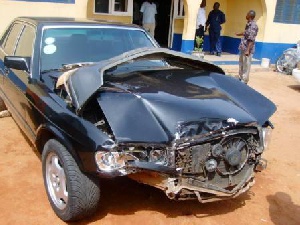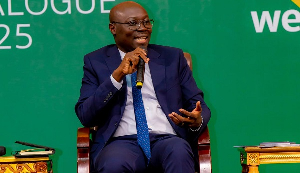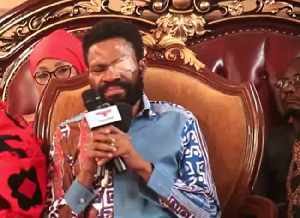The journalist who wrote that Mr. Rawlings had cheated death when his £100,000 two- seater Jaguar was run into by a trotro minibus received nearly the same level of condemnation as the driver of the trotro, who had used an illegal access route to join the Tema Motorway. The driver’s mate was later reported dead.
Talk went on that he had been brutally beaten by the President’s bodyguards until the poor boy had forgotten his own name. He passed out briefly after the ordeal and later passed through moments of suspended animation until he finally fell through. How could anybody be so unlucky, or perhaps, so careless to run into a presidential motorcade? The president could have died, but he survived the crash, so he had cheated death. This figurative expression simply means being lucky to avoid something untoward happening. On Radio Universe in Legon, media analysts debated whether the journalist had used an appropriate expression on an occasion when the sitting president of a country was involved in what could have been a fatal accident. I don’t remember where that useless debate ended; what I remember, though, is the public fury at the suicide-prone driving skills of trotro drivers in cosmopolitan Accra.
As careless as the expression sounds, I would have to borrow it to describe President J.A Kufour’s miraculous escape last Wednesday when his official car was crashed into at the Silver Star-Opeibea traffic lights by an E-Class Mercedes Benz driven by Thomas Osei, a 51 year old road contractor. Reports have it that the President’s black Mercedes limousine, a present from Libyan leader Col. Quaddafi, somersaulted three times, falling over to the next lane to face an oncoming vehicle cruising from the opposite side of the Liberation Road. In the President’s own words, he said: “all traffic had stopped as the motorcade passed, and all of a sudden there was a flash and I saw this vehicle. I heard a big bang. Before I knew my car was on its side with the wheels up.” When it stopped a shaken Kufour was helped out of the car by onlookers. The president had his hands over his head when he finally came out. He was reported to be doing fine after medics had seen him. Another president has cheated death. We also remember that just last week, presidential aspirant and Kufour buddy Alan Kyeremanteng, escaped unhurt when his entourage was involved in an accident in the Brong Ahafo region on a campaign activity. Needless to say, he also cheated death. Alan’s driver and two others perished.
Just as news about accidents and collisions were about dieing down, there are reports that presidential aspirant Nana Akuffo-Addo’s Mercedes Benz car was hit by a car on the Liberation Road, the same road the President’s accident happened. Nana’s clever driver had to produce exceptional skill to avoid a collision. Nana was unhurt in the event. Then, just yesterday there was further bad news that a group of Ghana’s legendary musicians traveling from Sunyani to Accra in a coach had a nasty collision with a taxi. Unconfirmed reports have it that Hi-Life generalissimo A.B. Crenstil was among those who were badly injured.
Of course, it is not simply a matter of whether our president cheated death or was cheated by death, as the case may be; there are serious underlying issues that need talking about. It is intriguing why it was onlookers who helped the president out and not members of his entourage. How did the offending vehicle get so close to the president’s car? Eye witness accounts have it that all traffic on the roads had been stopped, as it’s the routine, to allow the President’s motorcade enough room on the roads. And, Thomas Osei, the offending driver, had stopped too. The sirens were blaring at the expected decibel. Then, suddenly Osei, who was later found to be drunk, waged through the space ahead of him, disregarding the sirens to hit the President’s car. Could there be a motive behind the accident, or it was just a careless, stupid traffic incident?
We are tempted to rule out a terrorist attack because of our presumed safe location on the globe, where terrorists are not known to have a stake. If this had happened in London or the US, the first suspicion will be that the country is under terrorist attack. Terrorists would not have a stake in the death of an African president, let’s assume, but who must have had something to gain in that black Wednesday disaster? Somebody surely is to blame for this: the number one man in the country was nearly killed in a seemingly avoidable accident. Somebody has some accounting to do. The National Security Minister, Francis Poku, thinks so, too. He admits there are questions to be answered. He was emphatic that this was the time to find excuses, but he also concedes that we would have “to take lessons from this and take appropriate measures.”
The appropriate measure to be taken will be to axe those responsible for the president’s security. A president’s security is an important part of the government machinery. It is management science and protection policy fused together to guard the presidency against unpredictable occurrences. Mr. Francis Poku explained that the crash on the president’s car was unpredictable. What kind of security strategy only waits for predictable accidents? Accidents by nature are normally unpredictable; that is why we pay security experts to protect us. And, their duty is to prevent the unpredictable from happening. More than anybody else, Mr. Poku, or whoever is responsible for the personal security of the president, has a lot explaining to do. Somebody must have gotten so consumed in a certain routine that it was possible for a motorist to drive through blaring sirens, zoom past a motorcade to hit the most important car in a fleet of vehicles. It therefore means that if the driver of the offending vehicle was a paid assassin, he would have succeeded in killing the president in the presence of his security team. If the president’s security works, somebody must have seen the intruding vehicle in time to stop him. The president’s security is a shambles, I dare say.
Security that works is the one that anticipates the unpredictable. I saw a Hollywood movie recently, in which the villain was a shrewd, unassuming character whose part in the action was to kill the President of the United States of America. It was an objective he pursued with an all-consuming conviction, operating under different identities and swapping places with people close to the presidency. He goes as far as winning the affections of the woman who is the custodian of important information regarding the president’s security and his itinerary. He manages to obtain a special invitation to an event where the President was billed to address an august gathering. He beats security to enter the hall with a wooden gun, which he assembles while at his dinner table facing the podium. Just as he aims a shot at the president, the president’s security chief, who had been following his every move, throws himself in front of the president, to receive the bullet. The president is whisked to safety while the security man sustains some bullet shot injuries, cheating death with his bullet proof vest underneath his apparel. This is what security is all about. It is prediction, alertness, smartness and conviction, all rolled into one. There are no excuses; the president must be safe at all times. No cock ups!
I wonder if Kufour would have survived assassination if the above scenario was visited on the Osu Castle. His security, which is so liberal to allow motorists to drive through a motorcade, would be fooled, because the event would be so unpredictable. The security at the 37 Military Hospital was very tight when the President was sent there for check up after the accident. The Brigadiers were there in their numbers to show how safe the President was; they had forgotten that their uniforms would have been a shame if a lone motorist has made nonsense of national security to kill the president in such a predictable accident. I wonder what the senior military men were doing at the hospital.
Even more shocking is the rather laughable situation that those who helped the president’s limousine down were not professionals or his bodyguards; they were passersby who happened to be at the scene of the accident. The President’s car was lying supine, and the sympathizers got together to push it down at the count of 1, 2, 3, as we usually do, to put ourselves on cue when lifting a heavy object. They also had time to open the door of the limo for the noble survivor to get out. So, if they were accomplices in a plot to kill the president, they would have succeeded in chopping off his head, and had ample time to put it in a bag before any security person got there. It is incredible to imagine that ordinary members of the public could have virtually unrestrained access to a country’s president in an event like this.
Apart from the fact that those who attended to the president could have harmed him if they had been terrorists, it is against health and safety rules for an untrained person to stretch forth a helping hand in accident situations. As well-intentioned as they would be, amateurs have no idea where not to touch to worsen a fracture or force out a broken bone. In places where health and safety matter, a little cut on the forefinger has to be taken care of by first aiders. When a health condition worsens, paramedics are necessarily sought, and waited upon until any assistance is administered. The five witnesses who helped our president out of his car are heroes only because a terrible security had allowed it. They are good people who felt the need to come to the aid of somebody in danger. I am sure they would have done the same if the victim had been anybody else but the president; it is part of being Ghanaian. The President has received a lot of support and encouraging messages from the Ghanaian public. He is going about his duties as usual.
Even so, we still have some mourning to do. I don’t know the strategy Kufour’s security team employ in guarding the president. It is not always that a presidential motorcade will have the president sandwiched by bullet-proof cars, with two large motorcycles leading the convoy; sometimes the president would be in the office already, having his tea and making his first phone call. Other times, and it usually does, he would be home in his pyjamas while the siren will be breaking our tympanic membrane. Most of the time, he is part of the convoy. Somebody surely has a lot of explaining to do about security.




![New IGP, COP Christian Tetteh Yohonu [L] and immediate-past IGP, Dr. Akuffo Dampare New IGP, COP Christian Tetteh Yohonu [L] and immediate-past IGP, Dr. Akuffo Dampare](https://cdn.ghanaweb.com/imagelib/pics/140/14041582.295.jpg)











